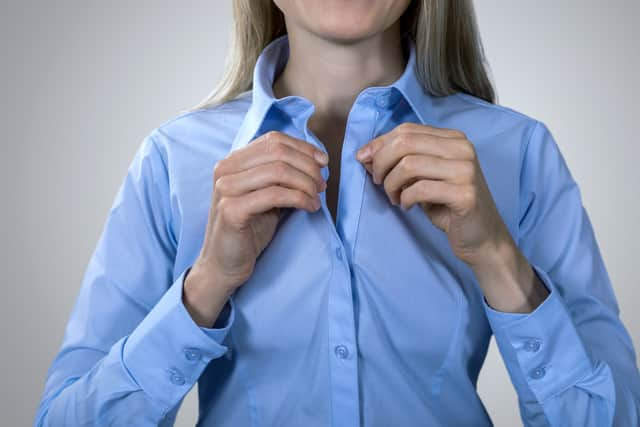What is downblousing? Meaning explained, why it could be made illegal in England and Wales - and current law
and live on Freeview channel 276
Rishi Sunak has pledged to make downblousing a criminal offence if he comes Prime Minister, backing the legal experts who are also calling for it to become an illegal offence to take photos down a person’s top without their consent.
New proposals aim to protect people against the act, called downblousing, and also victims of intimate image abuse and revenge porn by changing current laws in England and Wales.
Advertisement
Hide AdAdvertisement
Hide AdA ban on sharing pornographic deepfakes, which are images and videos which have been changed so that the original face is replaced with somebody else’s, without consent has also been recommended.
The call comes three years after the offence of upskirting became a criminal offence in England and Wales in 2019.
Upskirting is a covert type of abuse which typically involves someone taking a picture under a person’s clothing, typically up their skirt as the name suggests, without them knowing.
So, what are the current laws, what changes are the experts calling for, how has the government responded and what has Rishi Sunak said?
Here’s everything you need to know.


What is the law in England and Wales now?
Advertisement
Hide AdAdvertisement
Hide AdIn England and Wales, acts such as upskirting or voyeurism are criminalised, but there is no specific law regarding downblousing.
A new law for upskirting came into force on 12 April 2019 across England and Wales. It had already been illegal in Scotland since 2010. In March the Northern Ireland Assembly passed new laws criminalising upskirting.
The recommendations from The Law Commission would extend these laws further to cover the act of photographing a woman’s bra, cleavage or breasts in England and Wales.
What is the law in Northern Ireland and Scotland now?
This offence has already been covered in law in Northern Ireland.
Advertisement
Hide AdAdvertisement
Hide AdNorthern Irish Justice Minister Naomi Long, who strengthened the law in this area in Northern Ireland, told the BBC that people convicted of the offence will serve up to two years in jail.
She said: "New offences have been created for upskirting, downblousing and cyber-flashing where those convicted will be liable to a maximum of two years’ imprisonment.
"I believe these new provisions will offer greater protection in Northern Ireland and that it will have a real, tangible and positive effect for victims.”
In Scotland, upskirting has been banned since 2010, with the Sexual Offences (Scotland) Act 2009, which outlaws sexual crimes, amended to include upskirting in a widened definition of voyeurism.
Advertisement
Hide AdAdvertisement
Hide AdProsecutions of the crime in Scotland have remained low since it was brought into scope, with an average of three upskirting prosecutions a year between 2011 and 2018.
What are the proposals for the change in the law?
The recommendations come from The Law Commission, which reviews and updates legislation.
The are:
- It would be an offence for someone to intentionally take or share an intimate image of a person without their consent
- This new base offence would apply regardless of the perpetrator’s motivation and could lead to a maximum sentence of six months’ imprisonment
- If someone takes or shares an intimate image without consent to obtain sexual gratification, or to cause humiliation, alarm or distress, threatens to share an intimate image, or installs hidden equipment, they could receive a sentence of two to three years’ imprisonment
Professor Penney Lewis, the law commissioner for criminal law, said: "Sharing intimate images of a person without their consent can be incredibly distressing and harmful for victims, with the experience often scarring them for life.
"Current laws on taking or sharing sexual or nude images of someone without their consent are inconsistent, based on a narrow set of motivations and do not go far enough to cover disturbing and abusive new behaviours born in the smartphone era."
How has the government responded?
Advertisement
Hide AdAdvertisement
Hide AdThe government said it would carefully consider the recommendations.
A government spokesman said: "Nearly 1,000 abusers have been convicted since we outlawed revenge porn.
"With the Online Safety Bill, we will force internet firms to protect people better from a range of image-based abuse - including deepfakes.
"But we asked the Commission to explore whether the law could be strengthened further to keep the public safer.
Advertisement
Hide AdAdvertisement
Hide Ad"We will carefully consider its recommendations and respond in due course."
What has Rishi Sunak said?
Sunak has announced that if he wins the leadership race and becomes the next Prime Minister and Conservative leader then he woill make the act of taking photos down a person’s top without consent, known as downblousing, illegal.
Sunak has also given his commitment to supporting victims of sexual assault by ensuring they have life-long access to mental health treatment.
He said sexual violence against women and girls “should be treated as a national emergency”.
Comment Guidelines
National World encourages reader discussion on our stories. User feedback, insights and back-and-forth exchanges add a rich layer of context to reporting. Please review our Community Guidelines before commenting.
